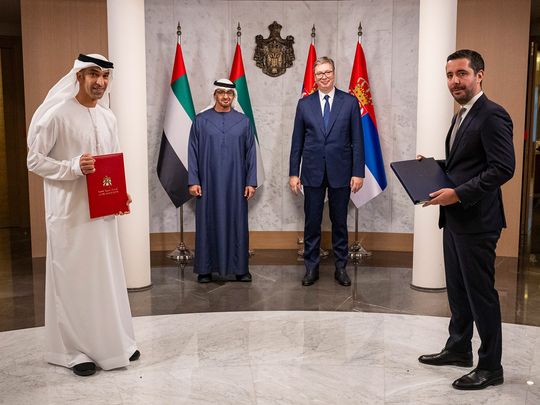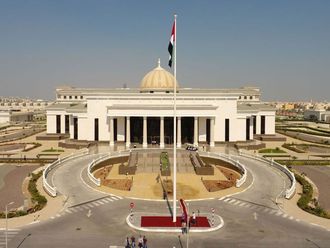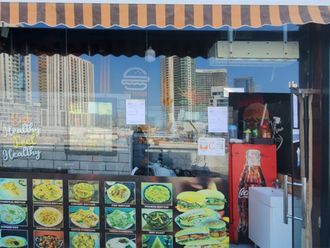
Belgrade: UAE President His Highness Sheikh Mohamed bin Zayed Al Nahyan and Aleksandar Vučić, President of Serbia, on Saturday witnessed the exchange of a Comprehensive Economic Partnership Agreement (CEPA), paving the way for increased trade and investment flows and bilateral private sector collaboration.
Sheikh Mohamed commended the exchange of the CEPA as a key milestone in the relations between the UAE and Serbia, stating: “The CEPA exchange with Serbia is a notable step forward in our efforts to create a network of trade agreements that will accelerate investment, promote knowledge-sharing, and create opportunities for joint ventures in high-growth sectors. Serbia represents an important addition to the CEPA programme and a bridge into the high-potential region of Eastern Europe. The UAE-Serbia CEPA reflects our shared ambition to establish a new era of collaboration between our nations and unlock long-term, sustainable growth for both our economies.”
The Serbian President highlighted the significance of the Comprehensive Economic Partnership Agreement, expressing his confidence that it would pave the way for new opportunities in economic cooperation and diversification, fostering sustainable growth and prosperity for both nations.
The UAE-Serbia CEPA was exchanged during a ceremony by Dr Thani bin Ahmed Al Zeyoudi, UAE Minister of State for Foreign Trade, and Tomislav Momirović, Serbia’s Minister of Internal and Foreign Trade. The agreement will deepen trade and investment ties, accelerate growth in priority industries, create jobs, strengthen supply chains, and enable private sector companies from both countries to do business in each other’s markets.
Diverse benefits
Once implemented, the UAE-Serbia CEPA is expected to remove or reduce duties on product lines, lift unnecessary barriers to trade, protect intellectual property rights, support small and medium-sized companies, and facilitate mutual investment flows.
The CEPA builds on developing relations between the UAE and Serbia. The UAE is the third-largest market for Serbian exports in the Middle East, and increased FDI has been directed toward high-priority sectors, including renewable energy, agriculture, food security, infrastructure, and logistics.
The UAE’s CEPA programme is a key pillar of the nation’s growth strategy, which targets $1 trillion in total trade value by 2031 and aims to double the size of the wider economy to surpass $800 billion by 2030. To date, agreements implemented in the programme, which was launched in September 2021, span the Middle East, Africa, Southeast Asia, South America, and Eastern Europe and encompass almost a quarter of the world’s population. The UAE-Serbia CEPA will enter into force following the successful ratification process by both sides.











